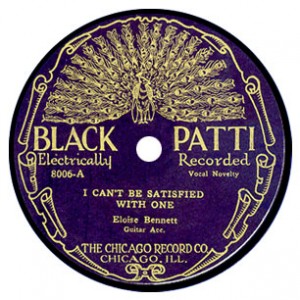Unfortunately, Sissieretta Jones, known at the “Black Patti,” apparently never made any recordings, although the technology was available during the latter part of her career. At least, at this point, no recordings of Sissieretta have been found.
White singers made recordings long before black singers. The very first African American to make a commercial recording was George W. Johnson in 1890, according to Tim Brooks, author of Lost Sounds, Blacks and the Birth of the Recording Industry, 1890-1919. Brooks credits contralto Daisy Tapley, singing a duet with Carroll Clark in 1910, as likely the first woman to record commercially in the United States. Music scholar Eileen Southern (The Music of Black Americans: A History), said Mamie Smith was the first documented recording of a black female singer. That recording was made February 14, 1920, five years after Sissieretta had retired from the stage.
Although Sissieretta did not make any recordings, she did have a “race record” label named after her — “Black Patti.” She had no part in the recording business named in her honor. In 1927 black talent scout J. Mayo (“Ink”) Williams, Dr. Edward Barrett, and Fred Gennett set up the Black Patti label as part of The Chicago Record Company. Williams recruited black singers and recorded them at sites in five U.S. cities. The Black Patti records were pressed and shipped from the company’s plant in Richmond, Indiana.
Williams had ties to Providence, RI, having lived there as a Brown University student and athlete. It is unknown whether he ever met Sissieretta, who made her home in Providence near Brown University. Between jobs at Paramount Records and Decca Records, Williams joined Barrett and Gennett to establish the Black Patti recording company. According to the Rhode Island Music Hall of Fame Historical Archive, Williams is said to have boasted that since everyone knew how great the famous Black Patti (Sissieretta Jones) was, they “could be guaranteed top-notch recordings of any record from the label which carried her name.”
 The Black Patti record label was quite distinctive. It was purple and gold and featured a peacock with its wings spread wide. Today, these records sell for hundreds of dollars and can often be found on E-Bay auctions.
The Black Patti record label was quite distinctive. It was purple and gold and featured a peacock with its wings spread wide. Today, these records sell for hundreds of dollars and can often be found on E-Bay auctions.
The company made 55 Black Patti labels before it ceased recording in September 1927, less than eight months after it began.
For more information on the Black Patti label, see the 78 Quarterly magazine, No. 11 (circa 2000),. This issue of the magazine is devoted to the Black Patti label.